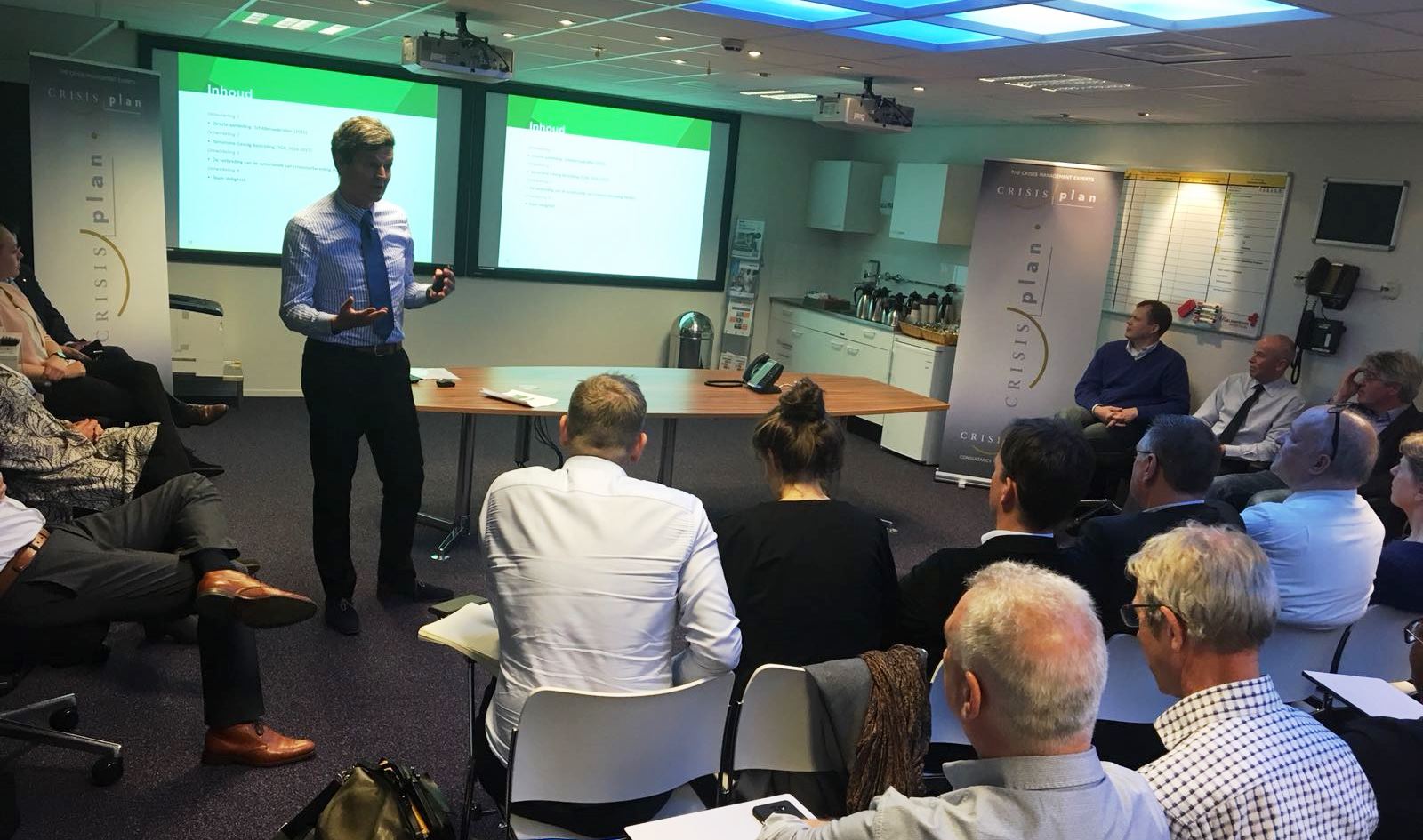On Wednesday April 3rd, Crisisplan organized an interactive event regarding the future of Dutch crisis management. Over 50 crisis professionals, all experts in their fields of expertise (e.g. police, safety regions, critical infrastructure), attended the event and participated in the discussion. The event was held in the headquarters of the Dutch calamity hospital.
Arjen Boin provided the kick-off by introducing the overarching theme, as published in a recent article with Werner Overdijk. In this publication, they argue that the information flow from the operation towards the strategic level is an important bottleneck during crises.
Martijn Reeser from the municipality of The Hague explained how their Security Team developed a strategic checklist together with Crisisplan. This checklist provides guidance and focus in supporting the strategic level. The checklist method helps to efficiently request operational information to facilitate strategic decision making.

The complexity of crises was discussed in a presentation by Jacco Rodermond from the Safety Region Drenthe. Also, the distinction between a crisis and a disaster was elaborated on.
During the discussion with the participants, it became apparent that the current role of the information manager isn’t clearly defined and future-proof. Participants stated that a common approach to manage crises is still unavailable in the Netherlands. The day ended with a tour through the calamity hospital.
This special event provides food for thought about future crisis management. Crisisplan and the participating professionals gladly continue this discussion.

New Book: Civil Protection Cooperation in the European Union
Based on unique survey data and interviews in nineteen EU member states, this exciting new book by Sten Widmalm, Charles Parker & Thomas Persson explores the challenges the EU and its member states face in order to achieve more effective cooperation in the quest to better protect its citizens, namely in the critical field of civil protection. It provides insights to what kind of cooperative structures exist in Europe in this issue area—in single countries, between countries, and at the EU level. It shows how trust, shared norms, cooperative networks, and administrative culture determine how well the system functions and the ability of countries to cooperate in this area. It also analyses how much cooperation within the Union can be sensibly expected and which cleavages and barriers must be overcome in the pursuit of future policy reforms.
The best book on EU civil protection!
For more information: https://www.palgrave.com/gp/book/9783030028572.
The Transboundary Crisis: Why we are unprepared and the road ahead
Modern society is increasingly facing a transboundary threat environment. More and more crises emerge from faraway domains. This development challenges the pillars on which modern response systems rest. In this new article, Arjen Boin explores the challenges and explains why we are not ready to deal with these transboundary crises. The article concludes with a research agenda.
The article is free to download through Wiley.
Arjen Boin shares insights during conference in Japan
Last week, Arjen Boin attended the second conference of the International Network of Disaster Studies in Morioka, Japan. He shared his insights on the Transboundary Crisis: crisis which will be hard to manage in the near future, due to the complexity of our systems and agreements, quick escaltaion phases and the absence of clear (policy)domains in which the crisis unfolds.
Arjen Boin in Japan
The conference theme was Landscape-Scale Disasters, Emergency Response, and Regional Recovery. Arjen learned more about the resilience of local communities at the coast during the aftermath of the 2011 tsunami and nuclear disaster.
First ZONeSEC pilot demonstration coordinated by Crisisplan
Crisisplan coordinated the first pilot demonstration of ZONeSEC, an FP7 project dedicated to developing an integrative and affordable solution for the surveillance of large critical infrastructures. The ZONeSEC team recently deployed the developed system at Acciona (highway operator in Spain) and demonstrated different technologies for detecting and localizing illicit patterns of activity. Check out the pilot video below!
Crisisplan organized a discussion on future Dutch crisis management
On Wednesday April 3rd, Crisisplan organized an interactive event regarding the future of Dutch crisis management. Over 50 crisis professionals, all experts in their fields of expertise (e.g. police, safety regions, critical infrastructure), attended the event and participated in the discussion. The event was held in the headquarters of the Dutch calamity hospital.
Arjen Boin provided the kick-off by introducing the overarching theme, as published in a recent article with Werner Overdijk. In this publication, they argue that the information flow from the operation towards the strategic level is an important bottleneck during crises.
Martijn Reeser from the municipality of The Hague explained how their Security Team developed a strategic checklist together with Crisisplan. This checklist provides guidance and focus in supporting the strategic level. The checklist method helps to efficiently request operational information to facilitate strategic decision making.
The complexity of crises was discussed in a presentation by Jacco Rodermond from the Safety Region Drenthe. Also, the distinction between a crisis and a disaster was elaborated on.
During the discussion with the participants, it became apparent that the current role of the information manager isn’t clearly defined and future-proof. Participants stated that a common approach to manage crises is still unavailable in the Netherlands. The day ended with a tour through the calamity hospital.
This special event provides food for thought about future crisis management. Crisisplan and the participating professionals gladly continue this discussion.
International Network of Disaster Studies organises conference in Japan
From July 17-19 the International Network of Disaster Studies will have its second conference. The theme will be Landscape-Scale Disasters, Emergency Response, and Regional Recovery. Iwate University, has generously committed to host this conference from July 17-19, 2018, in its home city of Morioka, Japan. Morioka is located about two hours north of Tokyo by high-speed train connection.
The International Network of Disaster Studies is not a formal organization but simply a loose association of university faculty and other senior researchers who get together to exchange ideas and discuss issues of mutual interest. At the initial conference in Haikou, China, in January 2017, participants came from more than a dozen countries.
During the conference, there will be multiple topical panels with papers, presentations, and discussion, as well as ample opportunity for informal dialogue among participants outside of the formal program.
For more information and registration, see https://inds-iwate.org/en/index.html
Paper or presentation proposals may be submitted at https://indsiwate.org/en/submission.html (deadline: March 19, 2018).
Crisisplan supports groundbreaking NATO initiative in Jordan
The North Atlantic Treaty Organization (NATO) launched a Defence Capacity Building Project on “Enhancing Jordan’s capacity for Crisis Management, Continuity of Government and Exercises” on Monday 19 February 2018. The three-year project will assist the Jordanian National Centre for Security and Crisis Management in achieving full operational capability, and will enhance Jordan’s capacity in national resilience, continuity of government and crisis management.
As the first NATO Defence Capacity Building Program project that supports civil protection and NATO’s commitment to enhancing resilience, this project presents unique challenges and opportunities. Supporting the project is Team Dynamis, comprised of Dynamis, Inc. as the lead contractor, along with partners Crisisplan, NL and Berglind-Manning, L.C.
Werner Overdijjk supports the project on behalf of Crisisplan. To read the press release on this exciting endeavor, please click here.
Are EU institutions ready for transboundary crises?
Crisisplan participates in the TransCrisis H2020 project and on March 6, 2018, the project partners organize a conference in Brussels.
Crisis management has become a central theme in debates about reinvigorating the European Union. However, what is the readiness of EU institutions to deal with crisis? What lessons can be learnt from experiences of crisis management inside the European Union and externally? What capacities should the European Union have and how can it prepare for effective crisis management?
This half-day conference focuses on the challenges of transboundary crises to the EU. Discussions will focus on both internal and external dimensions of EU crisis management, highlighting in particular the importance of organisational capacities among EU institutions, member states and non-state actors.
For more info: https://www.ceps.eu/events/are-eu-institutions-ready-transboundary-crises.
Introducing the CrisisHub: A revolutionary software platform for strategic crisis management
We proudly present our new software platform: The CrisisHub
Building on the insights of practitioners, we created a platform that is uniquely tailored to serve the strategic level in public and private organizations.
The CrisisHub helps to create situation reports for the strategic level. It offers checklists for strategic decision-making. And it contains crisis simulations for training strategic support teams.
For more information: www.crisishub.co
New Tool: Surveying Transboundary Crisis Management Capacities
The rise of transboundary crises appears inevitable. This type of crisis poses new and hard challenges to organizations and networks.
How to assess whether your organization is ready?
The answer is found in this blog by Arjen Boin, Lavinia Cadar and Maureen Weller: